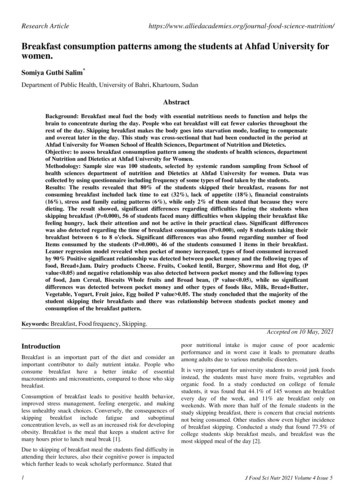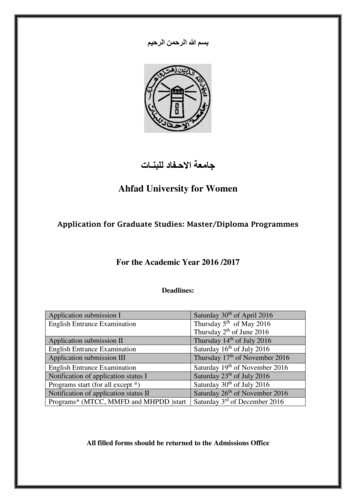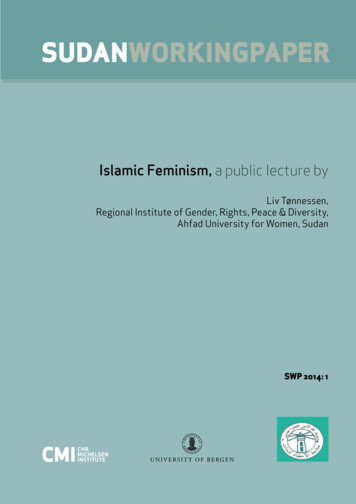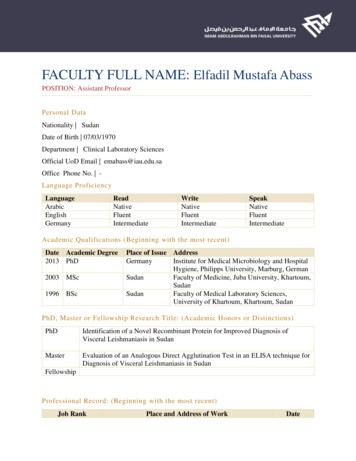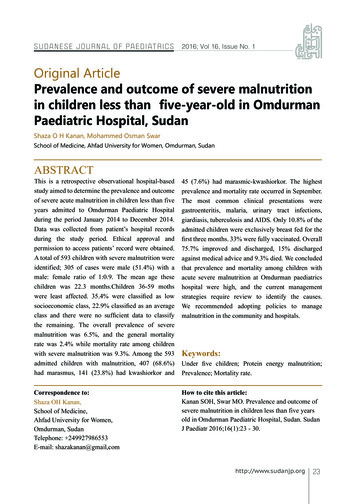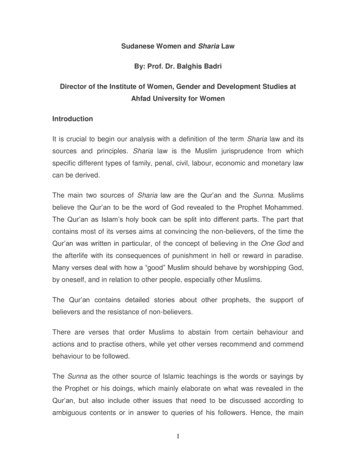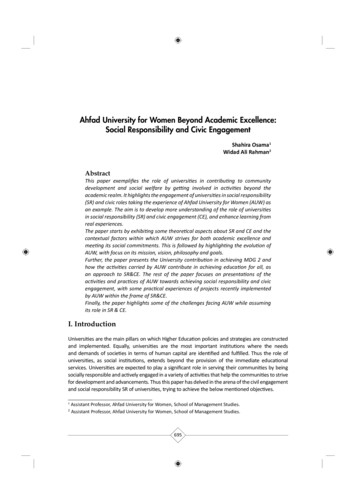
Transcription
Ahfad University for Women Beyond Academic Excellence:Social Responsibility and Civic EngagementShahira Osama1Widad Ali Rahman2AbstractThis paper exemplifies the role of universities in contributing to communitydevelopment and social welfare by getting involved in activities beyond theacademic realm. It highlights the engagement of universities in social responsibility(SR) and civic roles taking the experience of Ahfad University for Women (AUW) asan example. The aim is to develop more understanding of the role of universitiesin social responsibility (SR) and civic engagement (CE), and enhance learning fromreal experiences.The paper starts by exhibiting some theoretical aspects about SR and CE and thecontextual factors within which AUW strives for both academic excellence andmeeting its social commitments. This is followed by highlighting the evolution ofAUW, with focus on its mission, vision, philosophy and goals.Further, the paper presents the University contribution in achieving MDG 2 andhow the activities carried by AUW contribute in achieving education for all, asan approach to SR&CE. The rest of the paper focuses on presentations of theactivities and practices of AUW towards achieving social responsibility and civicengagement, with some practical experiences of projects recently implementedby AUW within the frame of SR&CE.Finally, the paper highlights some of the challenges facing AUW while assumingits role in SR & CE.I. IntroductionUniversities are the main pillars on which Higher Education policies and strategies are constructedand implemented. Equally, universities are the most important institutions where the needsand demands of societies in terms of human capital are identified and fulfilled. Thus the role ofuniversities, as social institutions, extends beyond the provision of the immediate educationalservices. Universities are expected to play a significant role in serving their communities by beingsocially responsible and actively engaged in a variety of activities that help the communities to strivefor development and advancements. Thus this paper has delved in the arena of the civil engagementand social responsibility SR of universities, trying to achieve the below mentioned objectives.12Assistant Professor, Ahfad University for Women, School of Management Studies.Assistant Professor, Ahfad University for Women, School of Management Studies.695
1. ObjectivesThe purpose of this paper is mainly to:a. Develop more understanding of the role of universities in civic engagement and socialresponsibilityb. Highlight the polices, strategies and actions which affirm the role of, Ahfad University forWomen (AUW) in civic engagement and social responsibility.c. Reflect how AUW activities contribute in community development.d. Identify the challenges encountered by AUW while assuming its civic role.2. MethodologyThis paper is guided by a mixed paradigm of doing research as it is basically within the «realworld research» paradigm, where the scrutiny of a social reality is its focus. It also builds on theconstructivist approach where the researchers see their task is to understand the multiple socialconstructions, meanings and knowledge around the phenomena (Robson, 2002) as given by theresearch informants and documents.The paper has greatly utilized secondary data from different sources mostly AUW relateddocuments, reports and research studies.Primary data has been obtained through interviews with some top level senior employeesproviding information in the relevant aspects. A sample of six individuals has been purposivelyselected using non-probability sampling techniques targeting those who could best reflect onthe policies and practices of AUW in civic engagement and social responsibility. These includedthe President of the University, Vice-president for Academic Affairs, Vice-President for FinancialAffairs, Deans of Schools, the Director of the Institute of Women, Gender and DevelopmentStudies, and the Executive Director of Babiker Bedri Scientific Association for Women Studies.Data analysis followed a simple qualitative data analysis technique by creating categories thatimply the different components of the actions of AUW and identify how they feed as civic andSR actions.II. Theoretical underpinnings1. Contextual Socio-Economic BackgroundAccording to UN human Development Index 2006, Sudan was categorized as a low – income,food deficient country and ranks as number 141 out of 177 countries and territories . AmongSudan›s 36 million people, life expectancy at birth is 58 for women and 55 for men. More thanhalf of the women are illiterate, as are three out of ten men. About 17 percent of children underthe age of five are under weight (WFP, 2007).Sudan is still poor in health provision and the morbidity rate is high owing to many reasonsamong them are malaria, diarrhea, communicable diseases and the like. The nutrition status ofSudanese people is poor and malnutrition is widely spread due to food shortage and imbalanceddiet. Despite of the progress made in Sudan in terms of health, economic and social servicesprovision, communication and transportations, still the coverage of these services is skewedand in some places or regions has declined. Gender inequality and gender gaps are prevalentdue to various socio-cultural factors, lack of political commitment, and limited resources of civilsocieties; these are manifested in great feminized poverty.Sudan ecosystem is fragile and is deteriorating rapidly due to multiple factors, mostly socioeconomic changes, which result in excessive grazing, falling of trees, soil erosion, desertification,696
over-hunting, land degradation and declining biological diversity. In addition the civil war thatcontinued for over two decades in the south and the conflict that broke out in 2003 in Dar Furhad displaced about 2 million people. The civil war has torn the country; it has depleted itsnatural and human resources, destroyed its infrastructure and driven the villagers out of therural areas into refuge, internal displacement and migration. The refugees are sheltered alongthe neighboring countries. The internally displaced gathered in camps outside the big cities inthe North, South, West and East after their villages had been raided, burnt, and their livestockbeen stolen.Moreover, Sudan has witnessed a massive population movement ( civil conflict, drought, andmajor floods), and increased population growth, disparities among regions in service provision,high illiteracy rates among poor urban and rural women, in addition to harmful customs,traditions and practices. Addressing these challenges have become the major directive forthe establishment of community oriented programs at Ahfad University particularly, the RuralExtension and Development program and the establishment of specialized schools to serve thecommunity such as the School of Rural Extension Education and Development, School of HealthSciences, and the School of Medicine AUW.2. Corporate Social Responsibility (CSR)Corporate Social Responsibility means different things to different people and is defined as the«managerial obligation to take action to protect and to improve society as a whole while achievingthe goals of the business» (Hatten, 1997). The manager of any socially responsible institutionshould be inspired to achieve goals, obey the law, act ethically and be a good corporate citizenmeeting the needed level of civic engagement.CSR and the level of commitment to it, guide strategic planning and the philosophy of anyinstitution stems from it. It is the obligation of any institution to maximize the positive impactsof its operations and maximize the impacts of these operations on the well-being of the societyat large. There are four basic levels of SR cited in the literature; economic, legal, ethical, andphilanthropic (ibid):a. Economic responsibilityHistorically the primary role of business - mostly relevant to CSR- has been economic. Theconcept has lately been extended to cover all types of institutions and their economies withfocus on the utilization of resources and energy in activities designed to increase social benefits.b. Legal responsibilityLaws can be seen as the society›s codes of right and wrong which exist to ensure that individualsand institutions do what is considered right. These codes change all the times as laws are added,repealed, or amended in an attempt to change public sentiment. Examples are laws protectingconsumers, the environment and some laws are ensuring equity and equality especially at theworkplace. SR implies strong commitments towards the laws and regulations within their contextas well as some of the laws that stems from international mandates and agreements (ibid).c. Ethical responsibilityEthics are the rules of moral values that guide decision-making by groups and individuals. Ethicalresponsibilities of institutions are about how its decisions and actions show concern for what itsstakeholders (employees, customers, and the community) consider as fair and just.d. Philanthropic GoodwillPhilanthropy is the highest level of social responsibility as illustrated in the literature. Thisincludes participating in programs that improve the quality of life, raise the standard of living697
and promote goodwill. The difference between ethical responsibility and philanthropy is that thelatter is not seen as an obligation; rather it is seen as a voluntary action and a contribution to thesociety to make it a better place (Hatten, 1997).Philanthropy is not limited to the wealthy, average citizens (individuals, institutions) can be andare philanthropic.Universities as institutions, and sometimes as businesses (private universities) are seen as bodiesacting in a socially responsive and philanthropic manner. By doing so, they assume both theirobligatory role and philanthropic goodwill (ibid).III. Why SR in Universities?A short answer would be that the world has changed in deep and challenging ways which demandthat new generations of managers and public officers take into considerations much more thanthe economic and financial performance in their decision – making, strategies and practices.Universities are where leaders of tomorrow will be formed in their understanding of the world,in the scientific frameworks they apply, and in their «coat» of values.As universities change in their values, understanding and practices, so does the practices of thefuture decision makers.Eventually, through a new professional class and their values and practice, a new culture isformed for all society.This is precisely the same reason that SR is of great social value because it changes the valuesand practices in organizations, and helps forming a new culture and starts deploying a culture ofsustainability and development (Loria, 2008).Thus a new social contract is needed in which collaboration and exchange among sectors is at theprelude of the activities of these sectors in order to face the challenges of a constrained reality.1. Higher Education and MDG 2: Universal EducationMillennium Development Goal (MDG) #2 mobilizes world leaders to ensure that, by 2015, childreneverywhere - boys and girls alike - will be able to complete a full course of primary schooling(grades 1 - 5). Universities are key institutions of civil society. They help in creating knowledge anddeveloping the skills needed to provide effective services to the community and to advice highereducation government policy. They train national citizens to become future leaders, policy-makers,scientists, teachers and other professionals who achieve and sustain the universal education goal.AUW since its inception, and for the future ahead is committed to this goal.2. The Evolution of Ahfad University for WomenAhfad University for Women (AUW) was the first non-governmental and non-profitable women’suniversity in the whole of the African and Arab region. The founder of girls’ education in Sudan(Sheikh Babiker Bedri,) lived at a time where girls and young women were nurtured towardssubjugation, domesticity, and ignorance. Having the gift of persuasion and foresight, SheikhBabiker Bedri in 1907 persuaded the society, British and local government ruling at that time andopened, in his own home, the first classroom where girls received their education. His son Prof.Yusuf Bedri, who succeeded him in 1954 continued to develop schools to be the pioneer of nongovernmental higher education in Sudan (AUW Prospectus, 2006).Yousif Badri influenced by that heritage of leadership became committed to find new ways toserve the Sudanese communities through higher education. He formed a committee of Sudanese698
scholars to help in developing a vision he outlined for disciplines that can be taught at the newcollege to serve new market needs and to create new horizons.Hence, the choice of the first two schools: one is Family Sciences with emphasize on nutritioneducation and home economics was selected as the most appropriate discipline to address thecommunities and family needs. This was the first time for this specialization to be taught withina Sudanese university.The second school is Psychology and Preschool Education. Also, it was a new specialization to beoffered to serve the market with specialists in managing and teaching in kindergartens, as well asspecialists in promoting psychological health. It is worth noting that Ahfad Kindergarten openedin 1936 was the first in Sudan to substitute the Khalwa, which is exclusively a religious pre-schoolestablishment for boys, of the age five to nine.Hence, the vision is to modernize education from childhood and to give the people prospects ofa healthy life physically and psychologically.The commitment to the different communities of Sudan, especially rural people, made YousifBadri think of a course to engage the students with rural people through their study program.Hence, the course of rural extension was introduced in 1972 to the students of family sciencesand then in 1974 became a university requirement. The fundamental mission is to create fromthose female students leaders in their societies with first-hand experience of identifying localpeople›s needs and addressing them. Moreover, graduating empowered females who haveskills to address these needs and become role models and change agents. Social change andthe training of future change agents was the vision that guided for the establishment of furtherschools, disciplines or programs. The School of Management was then opened in 1976, theSchool of Rural, Extension, Education and Development opened in 1987, School of Medicine withcommunity and problem based orientation opened in 1990, and School of Pharmacy openedin 2001. The evolution of Ahfad University for Women is characterized by the establishmentof unique units, centers, institute and postgraduate studies. The Ahfad University College forWomen was given the status of a full fledged university in May 1995 (AUW, 2008).3. Mission, Vision, Philosophy and Goalsa. MissionSince its inception AUW has a mission, which is to provide quality education for Sudanesewomen to become change agents, bridge the gender disparity in education, and participate incommunity development projects.b. VisionAUW vision is to create proactive women change agents and leaders from all parts of Sudan whocan participate actively in the development of their families and communities.c. PhilosophyThe philosophy of AUW is to prepare women to assume responsible roles in families, communities,and in the nation.d. Goals1) Prepare students and promote their skills to become leaders in diverse areas of knowledgeand intellectual spheres.2) Develop appropriate curriculum that would lead to promote the students’ analytical andcritical skills in order to contribute effectively for the improvement and enhancement ofthe Sudanese communities and people.3) Encourage scientific research in general and in women’s and gender issues in particular699
taking account of the importance of disseminating research findings through differenttools of publications, public debates, conferences and media.4) Develop outreach programs that are directly related to serve the outside communitiesparticularly in rural areas. These could be various programs of comprehensive nature forcontinual education, distant education, training, advocacy or awareness raising activitiesin a way to make the university an effective tool and seat for civic engagement withspecial focus to reach the rural communities.5) Create networking and close partnerships with the civil society, public and private sectorswhether nationally, regionally or internationally. These partnerships could be in areas ofjoint curriculum development to serve the needs of the society, state and the market aswell as contribute to the promotion of technology for services and production purposes.6) Establish good cooperation with other universities and academic or research institutesnationally, regionally and internationally in different spheres of knowledge promotionparticularly as pertaining to develop appropriate and relevant curriculum and technologythat serves the ever changing needs of Sudan (University Act, 1995).4. The Role of AUW in Achieving MDG 2a. Knowledge/Education: targeting the needy and the poorAUW seeks to reach girls between age 16 -21 and older age groups such as mature students.The university provides scholarships based for those who cannot afford to pay fees for highereducation, especially those coming from areas of conflict where women suffered doublediscrimination; from the patriarchal ideology and from the civil war and tribal conflicts. As a grouprepresenting the marginalized, AUW offers them special discretion in enrollment regulations aswell as scholarships to study in its various programs. The university makes an effort in raising fundsfrom partners to sponsor the scholarships and to convince local and state authorities to facilitatefor the students residence in Omdurman within the vicinity of the University campus. The firstcomers, coming to Ahfad from Darfur, South, and East, are considered as pioneers and receivedfull board residence at AUW campus to encourage parents to send their daughters to study atAUW. A special program was then opened to lead to a Bachelors degree in Rural Development,Extension and Education in 1986 that continued to enroll only students from disadvantagedareas, South, Nuba Mountains, Darfur, East, and Blue Nile areas. In 1998, it offered places forother students. This positive discrimination policy made AUW stand as the main university whichhas substantial numbers of graduates from these states (AUW, 2008).AUW has excelled in its affirmative action in student admission policy which has continued tocreate a diversified student population in relation to ethnicity, culture and religion representingdifferent parts of Sudan, and African countries such as Ethiopia, Eriteria, Nigeria, Comoros Island(AUW, 2005).AUW extends its education mission to reach poor urban communities and rural areas in Sudanthrough the university mandatory annual fieldtrips and family attachment projects. The outputsof these rural areas (covering 40 - 50 rural areas in Sudan) are community awareness raising anddevelopment projects. These (annually themed) projects target community problems such ashealth, sanitation, and environment, female genital mutilation (FGM), girls’ education, incomegenerating activities, HIV/AIDS and sexually transmitted diseases. The family attachment programis followed within the School of Medicine and is conducted by the medical students, where eachstudent is attached to a poor family to monitor the health conditions of the family until thestudent has graduated (Badri, 2005).700
Other means of reaching the grassroots is through collaboration with its outreach arms: TheBabiker Bedri Scientific Association for Women Studies (BBSAWS) and Community AnimatorsFriendly Association (CAFA). To maintain the mission of AUW in education, just to mention some,BBSAWS offered activities such as literacy classes, rehabilitation of schools, and financial supportto primary students in disadvantaged areas to continue their education (BBSAWS Report). Someof the activities undertaken by CAFA in support of disseminating information are awarenessraising programs, advocacy, and campaigns on reproductive health issues, gender-basedviolence, targeting females and males’ adolescents, youths, and the elderly (CAFA PerformanceReport 2004 - 2008).Moreover, the university in its efforts to ensure that poor children receive basic education amicro-credit project was established to provide poor women with funds to set up an incomegenerating activity to help them to pay for their children’s education (AUW, 2008).b. ResearchAUW strives to strengthen research and training capacities. Research activities are encouragedto contribute in solving some of the country’s social problems, through students› graduationresearch projects, which are guided towards tackling social issues and concerns. Social justice,gender equality and women empowerment, peace culture and conflict resolution are examplesof research projects undertaken by students. This will help integrating student and facultymembers' engagement in research projects and consultancies addressing community and socialdevelopment. The following is a sample of studies that were undertaken by AUW faculties incontribution to peace and conflict resolution, a major concern to all Sudanese communities.1) Book on “Sudan between Peace and War, IDP in Khartoum, Southern and WesternKordofan:, UNIFEM, Kenya, 1998.2) A document on “ The Initiative to Facilitate Women Participation in the Peace Process”, incollaboration with CARE international, 1999.3) Production of three training manuals, two on Peace Building and Conflict Resolution andone focusing on Peace Education within schools.4) Research Report on Darfur under Seige. AUW and Tufts University, USA.c. Women Empowerment ProjectWomen empowerment is one of Ahfad’s goals. The project has two fold objectives: one is toempower national citizens in integrating gender mainstreaming in policies, programs, andprojects. Second, to empower the powerless poor women through provision of micro-credit sothat they become self-sufficient and gain control over their lives and improve their living standardthrough regular income, as will be later explained in Section VII.IV. Civic Engagement Role of AUWThe philosophy of AUW of being community oriented and graduating potential change agentsin their local communities makes the university to be people-oriented biased towards thosedisadvantaged women to help them, through community development activities, to play acrucial role in their communities. This philosophy led AUW towards shouldering a prominent rolein civic engagement and participation as a means of achieving the University social responsibility.1. Objectives towards SR and civic engagement CEThe uniqueness of AUW in comparison to many other universities is in its commitment andsocial responsibility towards all Sudanese people through its various civic engagements being701
broadly reflected by the implementation of the various activities conducted by AUW aiming atthe following outputs (AUW Prospectus, 2006):a. “Degree requirement courses that engage the students with the communities or theformal institutions of both the public, private and international bodies”.b. “All outreach and extra curricula activities of academic, cultural and creative nature doneby staff, students and administrators using and involving all available national resourcesand international partnerships”.c. “Wide range coverage of population for its capacity building and institutional strengtheningactivities. The target population includes university students, staff, administrators, NGOs,media personnel, politicians, planners, lawyers, youth, grassroots organizations, civilservants professionals, and many others working at the public and private sectors”.d. “Production of information, education and communication (IEC) materials directed tothe local people or youth or any other special target groups for awareness raising. Also,educational materials that disseminate civic engagement activities of AUW and, thatencourage social responsibility and empowerment among the students”.e. Sponsorship to poor students and students from disadvantaged areas with free educationat AUW”.f. “Encouraging research that serves communities, the people as well as direct students torelish values of peace, social responsibility and have vision for improving quality of life.»g. To help in and/or offer Services to the public especially in remote rural areas, displacedcamps and sub-urban shanty areas”.h. “Engaging in national activities directly, or by linking to others or offering AUW spaces andstaff time to debate or celebrate national issues or figures.”i. “Activities undertaken by AUW arms, which are independently registered as NGOs andserve AUW's mission and goals and represent civic engagement activities” (AUW, 2008).2. Civic engagement policiesa. AUW policy is to adhere to principles of democratic values, equality, inclusiveness,respect to diversity, human rights and dignities, resolving conflict peacefully; allowing forthe promotion of persons potentials and respecting individual freedom within the law.b. Policies of developing curriculum that is community oriented, that allows AUW toachieve its vision, mission, goals and objectives are followed. The curriculum is alsodesigned in a way to meet international standards. Knowledge is Sudanized through casestudies, training and community outreach activities integrated in the curriculum (see fordetails university requirement courses such as rural extension course, women studies,environmental and population studies courses, see also family and field attachmentprograms and brochures of the master degree programs).c. Policies of encouraging the development of programs and projects that allow AUW tomaximize its civic engagement, also offer space to staff promotion and self education.Examples of them are projects to eradicate female genital mutilation, promotereproductive health, visionary leadership, culture of peace, and raise awareness on goodgovernance and democracy.d. Research and capacity building programs that would enhance the internationalizationobjectives as well as social responsibility achievement such as those developed withWestern universities in Norway, Holland, Germany, and Tufts or at regional level withAmerican University in Cairo (AUC), American University in Beiruit (AUB), Dar al salaam702
and Nairobi universities.e. Using the university facilities to offer services for staff, students and the neighborhood andcatchments areas within the university radius (e.g. kindergarten, primary and secondaryschools, health center, hospital, farm).f. The policy of students’ intake stipulates that tuition waiver is provided to needy studentsfrom all reigns of Sudan. Such students usually comprise about 30% of the annual intake.(AUW, 2008)3. Strategies and Mechanismsa. Reaching to all Sudanese sectors by offering diverse activities contributing to capacitybuilding and institutional strengthening.b. Instilling in students and staff the values of volunteerism and social responsibility.c. Promoting students and junior staff communication and leadership skills within class andat outreach activities.d. Enhancing students and staff potentials for maximum self-realization through offeringvarious curricula, extra-curricula, outreach activities and networking opportunities.e. Becoming actively engaged in national and international links serving Sudanese peopleand achieving AUW vision, mission and goals.f. Influencing policies, institutions and legislations to achieve a transformed society ofgender equality, overall justice and security through various advocacy programs,conferences, solidarity activism and targeted short courses and extra-curricula activities.g. Another strategy of establishing other institutionalized or informal arms that couldcontribute in AUW achieving its objectives and to be in line with its vision, mission andgoals is the establishment of NGOs such as Babiker Bedri Scientific Association for WomenStudies (BBSAWS), and Community Animators Friends Association (CAFA).V. Reflections on AUW Praxis toward Social Responsibilityand Civic EngagementThe analysis of the interviews and documents aimed at exploring the role of Ahfad Universityfor Women in social responsibility /civic engagement and how its curricula and extra-curricularactivities contribute to community development. As well as identifying the various challenges thatAUW encounters in assuming its role in civic engagement. Hence, the data from the interviews,supported by relevant documents, is analyzed into thematic categories.1. AUW Curricula: Community Oriented and Socially ResponsiveThe results of the interviews and analysis of relevant documents revealed that AUW providescommunity oriented curricula that are responsive to current and changing community needs.The curricula are a mix of learning and service provision as is explained below:a. The university has required courses to be taken by all students registered for BachelorsDegree, which include Rural Extension, Population Studies, Reproductive Health,Environmental Studies, Women and Gender Studies, Career Development, ResearchMethodology, Talents Development Skills, and Introduction to Behavioural Sciences.Issues of gender, democracy, poverty, population, and, human rights have beenintegrated into the undergraduate as well as the postgraduate courses. The aim fromthese university required courses is to instill in the students values of love, tolerance,703
cooperation, loyalty, critical thinking, altruism, and civic responsibilities. Also, to developstudents who become responsible citizens able to define their goals, needs, and to servefor achieving better life
Ahfad University for Women (AUW) was the first non-governmental and non-pro fitable women's university in the whole of the African and Arab region. The founder of girls' education in Sudan (Sheikh Babiker Bedri,) lived at a time where girls and young women were nurtured towards


